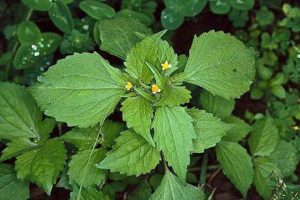Development of a Prototype Weed Management Model
Institution: University of Maine
Sponsor: Senator George J. Mitchell Center for Sustainability Solutions
A decision-aid to improve weed management on Maine organic farms

This project is developing a decision-aid tool to improve the economic sustainability of Maine organic farmers through improved weed management. Stakeholders will be included in the development of this tool and will also help publicize the finished product. Project researchers will synthesize results from the model underpinning this decision-aid to gain insight that will help identify priorities for future research.
A growing sector with a major production challenge
Farming is a growing sector of the Maine economy, with substantial increases over the past 10 years in the number of farms (17 percent), value of agricultural products (65 percent), and number of farmers under the age of 34 (46 percent). Many Maine farmers choose to grow organically, motivated by deeply held commitments to environmental sustainability. Organic farming practices are typically more environmentally sustainable than conventional practices. However, economic sustainability is a challenge.
Agricultural weeds are a foremost production challenge on organic farms in the Northeast. There is clear need and support in the organic farming community for tools to help farmers effectively target specific weed issues.
This project will leverage existing datasets to create a model that will simulate the impacts of multiple weed control tactics, incorporated into realistic farm management rotations, on the population dynamics of weed species problematic to Maine organic vegetable farmers. This weed management model is novel; we are aware of no other efforts to implement such a model for organic vegetable systems. Models of this kind are useful in that they offer relatively low-cost means of utilizing existing data to greatly expand existing knowledge.
The model will form the basis of a web-based decision-aid that will assist farmer decision making by allowing farmers to virtually experiment with farm management rotations and see the impacts on the populations and seedbanks of target weed problems.
Team Leader
- Eric Gallandt , School of Food and Agriculture, UMaine
Team Members
- David Hiebeler , Department of Mathematics and Statistics, UMaine
- Aaron Hoshide , School of Economics, UMaine & Farmer at EIEIO Farm (Bangor, ME)
- Sonja Birthisel , PhD Student in Ecology and Environmental Sciences
Outcomes:
WEEDucator – The prototype digital weed management tool
Available for download
Mitchell Center Sustainability Talk, Nov. 27, 2017
Dirty Weeds Done Dirt Cheap: Coupling weed ecology and economics to aid farmer decision-making (Link to Vimeo)
Mitchell Center News, Nov. 28, 2017
Bank Robber
Portland Press Herald Article, Nov. 26, 2017
Sonja Birthisel will help you meet the beetles
Oral Presentation, January 2018
Birthisel, S.K. and E.R. Gallandt, 2018. WEEDucator: A Digital Tool for Organic Weed Management Education. Weed Science Society of America Annual Meeting, Arlington, VA.
Abstract: WEEDucator is a game-like digital tool designed for beginning farmers and agriculture students and developed in partnership with new media artists; a project goal was to create a tool that users found ‘fun.’ The current iteration of WEEDucator contains three learning modules: 1) an interactive guidebook illustrating weed lifecycles, 2) a gallery of videos and infographics describing organic weed management best practices, and 3) a simple management simulator that lets the user build a season-long weed management plan, and see potential impacts on weed density and the seedbank. We convened a focus group of established organic farmers to provide input on the tool’s design and help prioritize content for inclusion. To test WEEDucator’s efficacy as a teaching tool and collect user feedback for improvement, anonymous Pre- and Post- surveys were administered to students (N=19) recruited from two University of Maine sustainable agriculture courses during the 2017 fall semester. Mean knowledge scores increased by 58% after exposure to WEEDucator, and respondents’ confidence in their answers increased by 107%. A majority (>90%) indicated that they found WEEDucator helpful and fun to use. Respondents were asked to rank in order of preference methods through which they might learn this content. WEEDucator was tied with lab and classroom activities as most preferred, significantly exceeding YouTube videos, classroom lectures, and reading a textbook. Overall, WEEDucator is a promising proof-of-concept for how computer games and new media can contribute to student learning and engagement.
